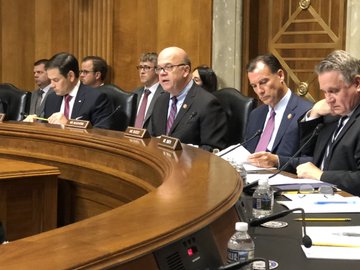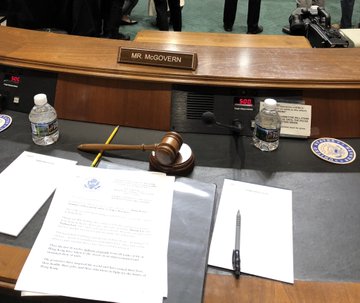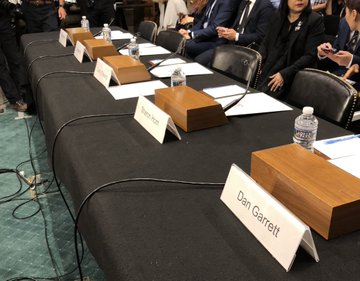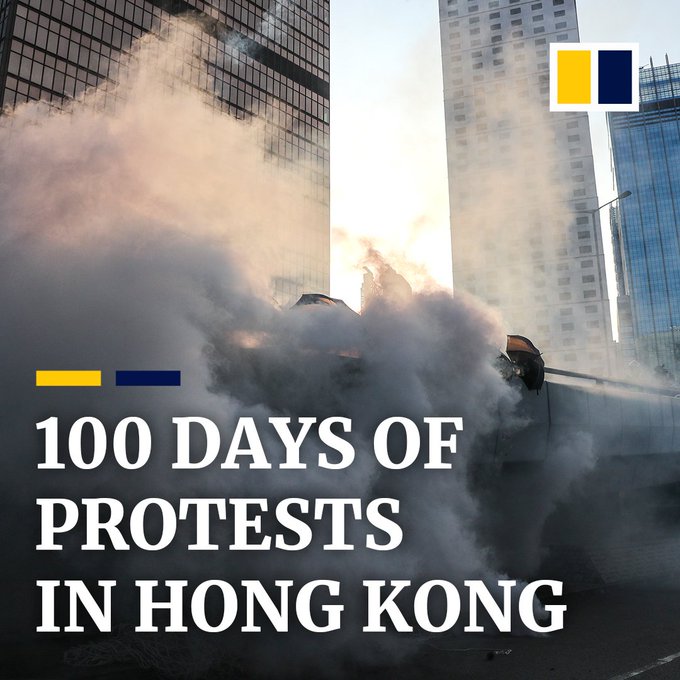By Ishaan Tharoor

For close to four months, protests have raged in Hong Kong.
During that time, Trump has been a somewhat inconspicuous bystander.
In August, he described the upheaval as “a very tough situation” but praised Chinese dictator Xi Jinping for acting “very responsibly” — no matter the reports of excessive police brutality and Chinese troop buildups along Hong Kong’s border with the mainland.
Trump’s former top diplomat in Hong Kong even described the protests earlier this summer as a “second-tier” matter.
But that’s hardly the view in the rest of Washington.
But that’s hardly the view in the rest of Washington.
Antipathy toward China marks one of the few sources of bipartisan consensus in the fractious capital.
On Tuesday, the plight of Hong Kong’s pro-democracy protesters took center stage at a hearing of the Congressional-Executive Commission on China.
The panel’s participants — a selection of notable Hong Kong activists and scholars — and the lawmakers in attendance stressed their commitment to Hong Kong’s democracy struggle and distaste for Chinese authoritarianism.

Rep. Jim McGovern
✔@RepMcGovern
HAPPENING NOW: The@CECCgov is holding a hearing on #HongKong.
Watch live at the link below
 https://twitter.com/ceccgov/status/1173936636989718529 …
https://twitter.com/ceccgov/status/1173936636989718529 …



China Commission
✔@CECCgov
WATCH #HONGKONG HEARING: Hearing will be livestreamed on the @CECCgov
YouTube Channel and also broadcast live on @cspan
on #CSPAN3 and C-SPAN Radio. https://www.youtube.com/watch?v=zQJZTi-XRls&fbclid=IwAR2tiQnuttwbaySbRq7A-OTW8qyY-bYUnj3dtoc-bjTCf0GjoFGQZMJgKyg …
749
4:09 PM - Sep 17, 2019 · Washington, DC
Twitter Ads info and privacy
598 people are talking about this
“China’s leaders must respect Hong Kong’s autonomy or know that their escalating actions will lead them to face real consequences, not just from the United States but from the free world,” said Sen. Marco Rubio (R-Fla.), one of the co-chairs of the commission and a prominent Beijing critic.
Though the city’s Beijing-backed chief executive, Carrie Lam, ultimately heeded protesters’ calls to withdraw a controversial extradition bill, that has done little to satisfy their broader demands.

Rep. Jim McGovern
✔@RepMcGovern
HAPPENING NOW: The@CECCgov is holding a hearing on #HongKong.
Watch live at the link below

 https://twitter.com/ceccgov/status/1173936636989718529 …
https://twitter.com/ceccgov/status/1173936636989718529 …


China Commission
✔@CECCgov
WATCH #HONGKONG HEARING: Hearing will be livestreamed on the @CECCgov
YouTube Channel and also broadcast live on @cspan
on #CSPAN3 and C-SPAN Radio. https://www.youtube.com/watch?v=zQJZTi-XRls&fbclid=IwAR2tiQnuttwbaySbRq7A-OTW8qyY-bYUnj3dtoc-bjTCf0GjoFGQZMJgKyg …
749
4:09 PM - Sep 17, 2019 · Washington, DC
Twitter Ads info and privacy
598 people are talking about this
“China’s leaders must respect Hong Kong’s autonomy or know that their escalating actions will lead them to face real consequences, not just from the United States but from the free world,” said Sen. Marco Rubio (R-Fla.), one of the co-chairs of the commission and a prominent Beijing critic.
Though the city’s Beijing-backed chief executive, Carrie Lam, ultimately heeded protesters’ calls to withdraw a controversial extradition bill, that has done little to satisfy their broader demands.
Hong Kong protesters are furious about the thuggish behavior of the city’s police force and, more significantly, determined to halt what they see as an erosion of their long-standing freedoms and democratic aspirations.
American lawmakers echoed that disquiet at the hearing and cast the protest movement at the vanguard of an epochal battle.
American lawmakers echoed that disquiet at the hearing and cast the protest movement at the vanguard of an epochal battle.
It’s common to speak of Hong Kong’s “one country, two systems” model, said Rep. Thomas Suozzi (D-N.Y.), but it also highlights “one world, two models” — that of Hong Kong’s open society, marked by civil liberties and rule of law, and that of China, an authoritarian state whose leadership is perfecting 21st-century methods of surveillance and repression.
Sen. Todd C. Young (R-Ind.) said China’s rulers may style themselves as “communist” but that they “are really fascist in behavior.”
“With the unrest in Hong Kong showing no sign of abating despite limited concessions by the city’s government, attention has shifted to what the West can or should do to influence the situation,” wrote my colleague Shibani Mahtani.
“With the unrest in Hong Kong showing no sign of abating despite limited concessions by the city’s government, attention has shifted to what the West can or should do to influence the situation,” wrote my colleague Shibani Mahtani.
“Protesters have been lobbying the U.S. government to pass the Hong Kong Human Rights and Democracy Act, which seeks to impose sanctions such as asset freezes and visa bans on those found to be ‘suppressing basic freedoms’ in Hong Kong.”
The bill, which is pending in the House and Senate, is likely to pass, and Trump has indicated that he will sign it into law.
The bill, which is pending in the House and Senate, is likely to pass, and Trump has indicated that he will sign it into law.
It would call for an annual review of the special relationship between the United States and Hong Kong, which allows a host of trade and business privileges that do not extend to mainland China. This relationship has, in part, enabled Hong Kong to become Asia’s financial capital — a position that became only more entrenched after Britain’s handover of its former colony to China in 1997.
Now, U.S. officials and Hong Kong activists say further attacks on Hong Kong freedoms — let alone a feared cross-border incursion from Chinese police or military forces — ought to bring that special relationship into question.
“Beijing shouldn’t have it both ways, reaping all the economic benefits of Hong Kong’s standing in the world while eradicating our freedoms,” Joshua Wong, a Hong Kong activist and veteran of the 2014 “umbrella revolution” protests, said at the hearing.
Now, U.S. officials and Hong Kong activists say further attacks on Hong Kong freedoms — let alone a feared cross-border incursion from Chinese police or military forces — ought to bring that special relationship into question.
“Beijing shouldn’t have it both ways, reaping all the economic benefits of Hong Kong’s standing in the world while eradicating our freedoms,” Joshua Wong, a Hong Kong activist and veteran of the 2014 “umbrella revolution” protests, said at the hearing.
He added that “our most important demand is genuine structural change in Hong Kong, which means free elections. Our government’s lack of representation lies at the heart of the matter.”

SCMP News
✔@SCMPNews
100 days have passed since the first mass march against the now-abandoned extradition bill in June. Since then, 2,414 rounds of tear gas have been fired and 1,453 protesters have been arrested.

6:05 PM - Sep 17, 2019
Twitter Ads info and privacy
108 people are talking about this.
There’s no sign that Xi Jinping would ever entertain allowing such political reform.

SCMP News
✔@SCMPNews
100 days have passed since the first mass march against the now-abandoned extradition bill in June. Since then, 2,414 rounds of tear gas have been fired and 1,453 protesters have been arrested.

6:05 PM - Sep 17, 2019
Twitter Ads info and privacy
108 people are talking about this.
There’s no sign that Xi Jinping would ever entertain allowing such political reform.
In his years in office, Xi has built a legacy of ruthless power consolidation, purging party foes, squeezing the space for civil society and exporting China’s technologies of control to countries around the world.
Under his watch, more than a million Turkic Muslims in the far-west colony of East Turkestan have vanished into concentration camps.
Hong Kong’s pro-democracy champions see themselves holding the line against an increasingly totalitarian advance.
“Through the challenges of Hong Kong, the West is waking up to China’s insinuating power in a global scale,” said Denise Ho, another prominent pro-democracy activist at the hearing.
“Through the challenges of Hong Kong, the West is waking up to China’s insinuating power in a global scale,” said Denise Ho, another prominent pro-democracy activist at the hearing.
What happens next is uncertain.
The protests will enter a critical period for Beijing.
Oct. 1 marks the 70th anniversary of the founding of the people’s republic, an occasion Xi and his cohort would not want clouded by scenes of chaos in the wealthiest Chinese city.
Sunny Cheung, a Hong Kong student leader at the hearing, said he doubted Chinese authorities would, at least in the near term, deploy outside forces or impose emergency law on Hong Kong.
Sunny Cheung, a Hong Kong student leader at the hearing, said he doubted Chinese authorities would, at least in the near term, deploy outside forces or impose emergency law on Hong Kong.
Such methods 30 years after the brutal crackdown at Tiananmen Square would “not be promising for the Beijing government,” he said.
Sharon Hom, executive director of Human Rights in China, invoked a saying by Mao Zedong to sum up the spirit of Hong Kong’s dissenters: “Wherever there is suppression, there will be resistance.”
Sharon Hom, executive director of Human Rights in China, invoked a saying by Mao Zedong to sum up the spirit of Hong Kong’s dissenters: “Wherever there is suppression, there will be resistance.”
Aucun commentaire:
Enregistrer un commentaire